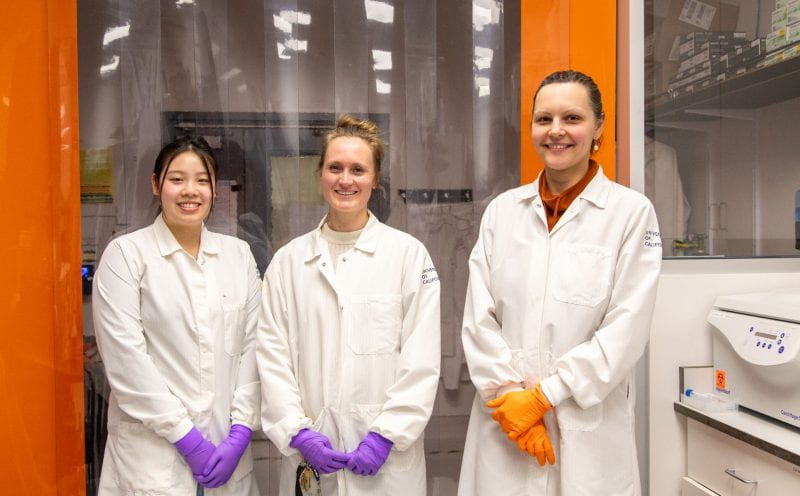Category: health news
-

Brain cells are more plastic than previously thought, study shows
Neurons are the cells in the brain responsible for sending messages to the rest of the body, and scientists have long thought that they are settled into one subtype once they develop from stem cells, no matter what is happening in the environment around them. New research from the Braingeneers reveals that this traditional way of thinking…
-

David Deamer named 2024 AAAS fellow
Emeritus Genomics Institute affiliate David Deamer was awarded the lifetime honor along with UCSC Professors Theodore Holman and Raphael Kudela. Deamer researched the foundational science needed to create nanopore sequencing, a revolutionary method for reading DNA and RNA.
-

The Human Genome Project’s legacy is still yielding new advances
At the 25th anniversary of the Human Genome Project, the Tech Brew looks back at what it has accomplished, and how its legacy of combining computation and biology has set the stage for future applications in medicine and new advances in AI-powered life sciences at the UC Santa Cruz Genomics Institute.
-

Clinical pediatric cancer lab at UC Santa Cruz is cleared to accept and test patient samples
The UC Santa Cruz Colligan Clinical Diagnostic Laboratory (CCDL) will use a newly clinically validated RNA test that they have developed that could identify life-saving treatment options, particularly for pediatric cancer patients.
-

New biology study reveals four novel genes required for male fertility in mice
Genomics Institute affiliate Upasna Sharma has conducted pioneering research to determine how a father’s life experiences and environment can influence the health and wellbeing of his children. Her most recent discovery could have important implications for understanding male infertility.
-

New grant funds effort to uncover therapeutic targets for neuropsychiatric disorders
By Emily Cerf A $10.3 million grant from the California Institute for Regenerative Medicine (CIRM), the state’s stem cell agency, will fund a multi-UC effort to better understand neuropsychiatric disorders. One in five people in the U.S. experience a neuropsychiatric disorder, with many cases starting in adolescence. Current treatments focus on managing symptoms, but there’s an…
-

New UCOP Grant to Explore Autism Spectrum Disorder Using 3D Brain Organoid Models
The University of California’s Office of the President has awarded QB3 a $1.8 million grant by the to explore the origins of autism spectrum disorder (ASD). The funds will support researchers in the “Braingeneers” group at UC Santa Cruz, UCSF, and UC Berkeley who will use brain organoids (3D models of neural networks grown from…
-

UCSC alum and current student make Forbes 30 under 30 list in healthcare
UCSC adjunct professor and alum Aviv Elor and UCSC PhD candidate Ash Robbins have been named to the Forbes 30 under 30 in Healthcare list. The two co-founded Immergo Labs to put artificial intelligence and virtual reality to work helping physical therapists in the telehealth domain. See the Forbes Profile.
-

Bioluminescent proteins made from scratch enable non-invasive, multi-functional biological imaging
Bioluminescence is the natural chemical process of light creation in some living creatures that makes fireflies flicker and some jellyfish glow. Scientists have long been interested in borrowing the secrets of these animals’ light-producing genes to create similar effects in vertebrates, for a variety of biomedical applications.
-

Postdoc Spotlight: Maryam Moarefian
Maryam Moarefian is developing a platform for studying neural networks in “cortical organoids,” model brain tissue grown from stem cells September 16-20 is Postdoc Appreciation Week, when we celebrate the incredible contributions that postdoctoral scholars make to the mission of major research institutions like UC Santa Cruz. The UCSC Genomics Institute benefits from the dedication…
-

Scientists find that small regions of the brain can take micro-naps while the rest of the brain is awake and vice versa
Sleep and wake: they’re totally distinct states of being that define the boundaries of our daily lives. For years, scientists have measured the difference between these instinctual brain processes by observing brain waves…
-

New study discovers tiny target on RNA to short-circuit inflammation
UC Santa Cruz researchers have discovered a peptide in human RNA that regulates inflammation and may provide a new path for treating diseases such as arthritis and lupus. The team used a screening process based on the powerful gene-editing tool CRISPR to shed light on one of the biggest mysteries about our RNA–the molecule responsible…